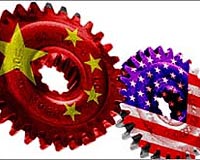 |
Washington (AFP) May 10, 2011 The United States on Tuesday sharpened its criticism of China's human rights record in high-level talks but the Pacific powers made headway in easing frictions over the economy. US Treasury Secretary Timothy Geithner said Beijing promised not to insist on Chinese technology when handing out government contracts, even at the local level, addressing a longstanding concern of foreign businesses. But the world's two largest economies took largely symbolic steps during the wide-ranging annual talks, with leaders of both sides saying they spoke openly about disagreements in hopes of building greater trust. "The United States and China have to be honest about our differences and address them firmly and forthrightly," Secretary of State Hillary Clinton said at the end of the two-day talks. "At the same time, we are working together to expand the areas where we cooperate and narrow the areas where we diverge," she said. One area of sharp divergence is human rights. China in recent weeks has launched its biggest crackdown on dissent in years, rounding up dozens of lawyers, writers, artists and other perceived critics. Clinton, in some of the toughest US criticism yet, said in an interview published Tuesday that China was wrong if it thought it could hold off change in the wake of the pro-democracy protests sweeping the Arab world. "They're worried, and they are trying to stop history, which is a fool's errand," Clinton said of Chinese officials in an interview with The Atlantic magazine. Showing that the US calls were not just rhetorical, the State Department approved $19 million in funding for technology to help activists break through the Internet firewall in China, Iran and other authoritarian states. The technology will include a cutting-edge "slingshot" that determines what governments are trying to censor and finds ways to redirect the information back to those countries, said Michael Posner, the assistant secretary of state handling human rights. China's Executive Vice Foreign Minister Zhang Zhijun insisted that his country was committed to human rights and asked the United States to look at its "remarkable progress" since the communist state was established in 1949. "No country including the United States is perfect on the human rights issue. It is only natural for China and the United States to see human rights differently in some aspects," Zhang told reporters. "So we call for a dialogue and consultation on the basis of equality, mutual respect and non-interference in each other's internal affairs," he said. State Councilor Dai Bingguo, who led China's team in the strategic track of the talks, also called for the two nations to respect each other's space. "The Chinese side reaffirmed its commitment to the road of peaceful development and will not challenge the United States' interests," he said. US and Chinese leaders made more progress easing tensions on economic issues, with Geithner welcoming the "very promising shifts" in the direction of Chinese policy. "We're very confident we're going to see substantial, ongoing improvement in the opportunities that American companies have in the Chinese market," Geithner said. Geithner praised assurances of equal treatment for US businesses and recognized that China has let its yuan appreciate due to inflationary pressures, although he said the pace was not enough. Geithner said a stronger yuan would help China hold back inflation and to transition from an economy based on exports to one based on consumption -- a fervent hope of US companies eager to enter the 1.3 billion-strong market. The United States accuses China of artificially undervaluing its yuan to fuel a flood of inexpensive manufactured goods for export. During the talks, China confirmed plans to offer scholarships to 20,000 US students over the coming four years -- part of a drive by the Obama administration to improve connections with East Asia. The United States and China also said they would set up regular talks on policy around Asia, where the two powers have often not seen eye-to-eye. In a sign of easing defense strains, military officers took part in the annual dialogue for the first time. China last year snapped defense ties for months after the United States approved a $6.4 billion arms package to Taiwan, which Beijing claims. Clinton said the military talks would help to "develop trust and avoid misunderstandings that can lead to dangerous miscalculations."
Share This Article With Planet Earth
Related Links Learn about the Superpowers of the 21st Century at SpaceWar.com Learn about nuclear weapons doctrine and defense at SpaceWar.com
 US, China clash on rights but ease economic rift
US, China clash on rights but ease economic riftWashington (AFP) May 10, 2011 The United States on Tuesday sharpened its criticism of China's human rights record in high-level talks but the Pacific powers made some headway in easing frictions over the economy. Treasury Secretary Timothy Geithner said Beijing promised not to insist on Chinese technology when handing out government contracts, even at the local level, addressing a longstanding concern of foreign business ... read more |
|
| The content herein, unless otherwise known to be public domain, are Copyright 1995-2010 - SpaceDaily. AFP and UPI Wire Stories are copyright Agence France-Presse and United Press International. ESA Portal Reports are copyright European Space Agency. All NASA sourced material is public domain. Additional copyrights may apply in whole or part to other bona fide parties. Advertising does not imply endorsement,agreement or approval of any opinions, statements or information provided by SpaceDaily on any Web page published or hosted by SpaceDaily. Privacy Statement |